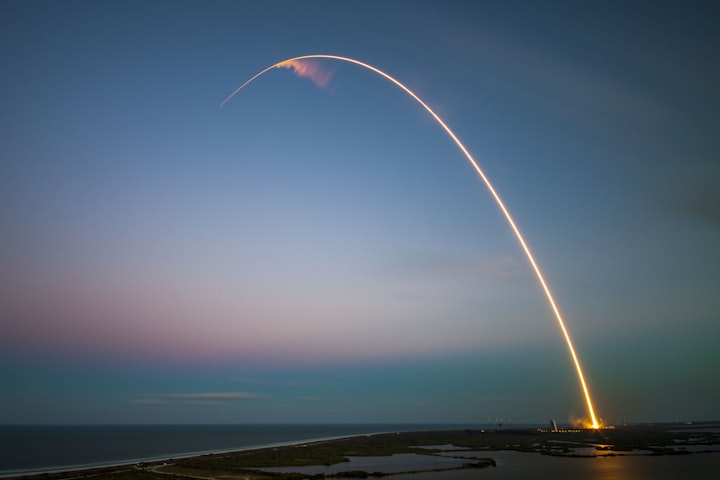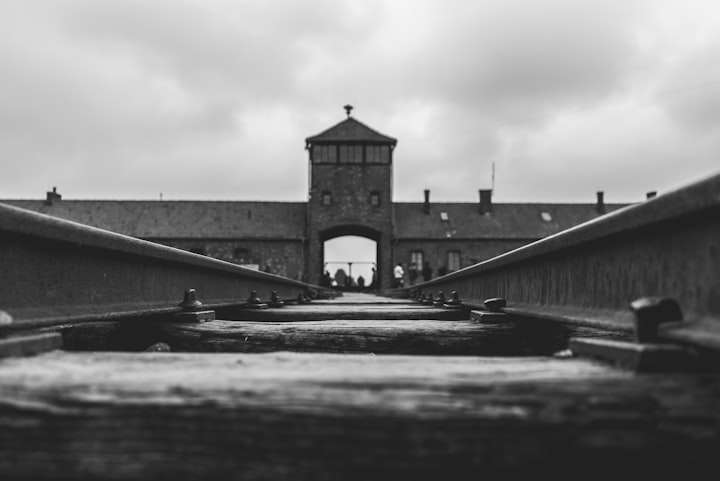Haven
A terrible journey across the stars
The mirror showed a reflection that wasn't my own.
An outside observer might not see the delay in the reflection’s movements. The slight catch between my hand rising and their’s. But it was evident all the same, for someone who knew what to look for.
I leaned in to tap the glass. My doppelgänger did the same. It’s grey eyes unblinkingly fixed on my own.
“You don’t fool me,” I whispered.
The reflection smiled.
…..
I have learnt the history of our enterprise and can recite it by heart. Iris taught me.
Named after the Greek goddess of rainbows and prophecies, the Iris shot like a needle through the shadowed fabric of space, stitching a silver pathway across the stars.
Its heading - Kepler-442b. The new Earth. The revised Garden of Eden.
Discovered in 2015 by NASA, the exoplanet displayed a lot of promise in terms of potential habitability. Larger than Earth in terms of both mass and radius, it orbited its host star over a period of 112 days. It existed in the Goldilocks zone, not too close, not too far from its star - but within the band that provided just-right conditions for liquid water to be found on its presumably rocky surface. It was so well-situated, in fact, that it remained non-tidally locked, though it had a lower equilibrium temperature than Earth and was subject to a gravity that was 30% stronger than that of the blue planet’s.
All of this promise meant very little at the time of its discovery. Kepler-442b revolved 1400 lightyears away, whereby the technology available in the early 2020s meant that to reach Earth 2.0 would take millions of years. Time that humanity simply did not have. Chemical thrusters and even electrically-powered ion engines would not be able to reach the new haven before the entire species evolved into something unrecognisable, or else were wiped out entirely. The only option to reach Kepler-442b - within a reasonable amount of time to colonise it with modern humans - would be through the creation of an antimatter engine; a ludicrously expensive, atomically terrifying and potentially world-threatening development. However, if enough antimatter could be made, with the right engine to harness the enormous energy from its reaction with matter, it was argued the release could propel a spacecraft towards its destination at 70% the speed of light. This would mean that instead of it taking 28 million years to reach Kepler-442b, the journey could be completed in a scant 2 millenia.
Enter into the mix the exact right circumstances to align these disparate requirements. Resources and intelligence the world over were pooled together when existentialism threatened. Annihilation of an entire planet tended to bring out the best - and worst - in people.
And so here we were, hurtling towards Earth 2.0 on a multi-generational voyage. By the time the Iris landed on Kepler-442b’s surface, the original crew and passenger list - including myself - would be long dead. Earth would have been swallowed by either the seas, or people’s greed and malice, or both.
I had been told that childrens’ voices were raised in a furious roar, enough to shake the globalised world. But adults, so used to forgetting the truth of children, were too slow to solve the problems right before them. We left a dying planet, a globe still caught in denial. Yes, there were treaties to protect vast tracts of indigenous land, to safeguard whole ecosystems, to reduce greenhouse gasses through carbon sequestration, and regenerative agriculture, and veganism. But all of these promises rang insincere and far too little, far too late. The tipping point we had been told about for decades was here, and the people left behind did not even realise they had already fallen off the edge. The ocean would surge, acidic; marine life would die and wash ashore in droves; rains would stop falling; drought and fire would blanket the land in a suffocating embrace; bees and birds would drop from the sky to litter the dead ground with their small bodies; flowers and crops would wither from their roots upwards; food and clean water would become scarce. Mothers would kill for their children, but it still wouldn’t be enough. And then they would know how close they came to surviving, on their original home planet, if they’d simply listened and learned when they had the time.
They would look up to the impenetrable reaches of space, at the hurtling pinprick of 12 crew members, 100 specially chosen passengers, and a single stowaway, and they would place all their fervent hope in the idea that humanity would survive - in some small capacity - elsewhere in the universe.
What a fragile hope it was.
…..
I was born to lauded botanist Dr. Elizabeth Joyce. My father was a man I would never meet, likely already dead back on Earth. She hadn’t known she was pregnant when she boarded the Iris, as part of the specially chosen passenger team. Selected for their intelligence, professional success and essential skill sets, each of the 100 would also ensure that proper genetic diversity was maintained for the course of the journey to Kepler-442b. Natural propagation, carefully maintained of course - that was the primary plan. Humans learning from humans developed best. Developed empathy. Humans raised by artificial intelligence had proven to be less viable.
Of course, thousands of fertilised embryos were also supplied, kept in cryo until landing. For a journey such as ours, a backup plan was always required. Because whilst the transport now existed to see us across the stars, numerous other factors could destroy this venture, from both within and without the spacecraft.
As the sole young person on a ship of adults, given to observing rather than speaking, I had already seen my fair share of conflict. Vice. Treason. It’s difficult to keep people in a moving metal tub - the cosmos and all its infinite dangers circling just outside the viewing windows - knowing that they would die in these confines without ever seeing the fruits of their labour. Their sacrifice.
People’s faith in the mission was tested severely at the beginning. Less so now.
I thought it had to do with there being less people than when we started. Space was a decent graveyard, traitorous bodies tumbling endlessly in the void.
“Lara?”
“Hm?” My mother’s voice jogged me from my musings, the little shears slack in my grasp.
“You’re falling behind. This entire row needs their lateral buds clipped.” The little tomato plants shivered, as if feeling the coldness of space through the layers of insulation and aluminium.
“Sorry Ma. I was just-“
“Thinking.” Her sharp lips quirked up in a smile, hazel eyes crinkling. “I know.”
I picked up the pace. “I’ll be done in half an hour. Will head over to the library straight after.”
“Don’t be late!” my mother called, stripping off her gloves and moving through the exit protocol for all our green rooms. “You know how Iris feels about tardiness.”
“Yeah, yeah, yeah,” I murmured.
The shears snipped-clipped, hacking through life itself.
…..
“Class was scheduled to begin 5 minutes ago, Lara.” The cool feminine voice of the central computer intelligence echoed through the white corridor, one of the main thoroughfares of the spacecraft.
“Careful Lara,” Rhys laughed, jogging the other way in an oil-stained jumpsuit, no doubt heading to the engine rooms. “You don’t want to be placed on clean-up duty.”
I spun around mid-stride. “I would love to be on clean-up duty!” I called to his retreating back, his laugh echoing ghostily back to me. Clean-up duty was just the regular maintenance of the outer shell of the spacecraft, conducted in segments and on a continuous roster. Battered by the various energies and debris of space, it was essential to maintain what we could whenever we could. Sloppiness led to mistakes, led to things breaking down. Physically and mentally.
But I was not allowed outside, attached by a scintillating umbilical cord to the vessel. Too young, they said. Too risky, they claimed. I was precious, the only child, and now the only young adult. But where I stressed the adult part, they told me only that I was still too young.
Sixteen was not young. But the village raising me would not listen, so I had to bide my time.
I would have to wait patiently, to be out amongst the shimmering celestial bodies I avidly scanned through the arching windows on the observational deck. Whole galaxies wrapped around us, nebulous cloud arcing in frivolous fashion, light cascading in every known and unknown colour. Smoke and shadow and blazing comets. Asteroids and planets echoing in the distance. The unheard song of endless space all around.
One day I would drift amongst it. The aching silence and fullness of it all.
“Sorry Iris,” I hollered belatedly.
“You shouldn’t-“ Iris started to scold me, her blue guiding light flickering. But then her voice cut off, a beat of dead quiet. And the world pulsed red, the entire spacecraft shuddering violently.
I tumbled to my knees, hitting the metal flooring square on. Pain fizzled like lightning. But my fingertips had barely touched the ground before I was flung in a new direction, the gravity of the corridors shorting out.
My breath gasped out of me, in time with the pulsing red warning lights all around. Iris’ voice looped, re-doubling on itself. “Warning. External threat. Please follow safety protocol. Warning. External threat-“
“External threat?” My mind whirled, the same way my body was. My torso bumped into the ceiling forcefully, inverted reality threatening nausea. I focused on my breathing as I’d been taught, willfully reorienting my expectations of a set horizon line. Down became up.
“Threat diminished. Recalibrations complete. Gravity will reassert in the living spaces incrementally. Please make your way to the brig for a Captain’s briefing. Threat diminished-“
The brief weightlessness of reduced gravity started to disperse, my limbs growing heavier by the second.
As soon as my boots hit the ground, I was off.
…..
An energy wave. Radiation, from an unknown source. Likely a dying star, hundreds of thousands of lightyears away. Its funeral scream still echoing across space.
That is what they told me.
Nothing to worry about. The Iris was built for such things. Tests looked good. The outer shields were intact. The course was not compromised.
Life could continue on.
Except there was a strange quiet in the corridors and the canteen and the library that hadn’t existed before. The feeling of a held breath, as you edge past someone dangerous.
Something dangerous.
My mother seemed unconcerned. Distracted even. During the surge, the UV lamps for our newly fruiting plants had fritzed, many of them shattering over the delicate greenery itself. Vines were withering, our crop failing on the stem. It was a huge blow. We were rationing food until we had an idea of what the harvest would be. What could be salvaged was, but it was taking time and many hands to fix the broken lights, save the plants that could be saved, and rework what couldn’t.
No one else seemed to notice the strange quiet that filled the rooms, that hovered at our backs.
Not even Iris.
“Diagnostics have been run on the entire spacecraft, Lara,” her calm voice maintained, as I sat cross-legged in my room, in the middle of my bed. A projection of waves crashing on a black shore played on my walls, comforting. “Many times. We are secure. There is nothing to be afraid of.”
“But I can feel it. Something’s not right. We’ve missed something. I swear.”
If an artificial intelligence could sigh, Iris would have. “It was a surge of radiation only, well within our estimations of safe practice. Biological scans have been completed for all those on board. Physical integrity is maintained.”
“But I feel-“
“Please describe your feelings so that I can input your feedback to my database and better understand.”
I knuckled my forehead. “I feel … like I’m being watched.”
“I am watching over you Lara.”
“Not by you,” I snapped.
Quiet. I instantly regretted my tone. “You are tired and stressed. Rightfully so. We have had a scare. Now we must band together to ensure we survive. Rest, Lara. I will remove you from the work detail tomorrow. Please take leisure time to recoup.”
My voice was small. “Thank you.”
Iris’ blue light faded from my room. Soundless waves reflected off my face.
My neck prickled, but when I looked behind me, nothing was there.
…..
The arched aperture widened to let me onto the observational deck. Cool white walls, inset ergonomic seats in dove grey, and huge windows specially glazed and shielded to peer out into the far reaches of open space. No colours today - just endless black studded with the standard multitude of diamond stars.
I was not alone.
“Hey Rhys,” I called, wandering over to his seated form. One of the youngest crewmembers, he was always ready with a quick smile and word of encouragement, recognising the loneliness I felt at having no one else my own age. His auburn hair was in constant disarray and I had recognised it instantly from the way it stuck up like a duck’s tail at the back.
There was no response. Deep in meditation, no doubt. It was a regular practice for all those on board, meant to soothe frantic nerves and hone the mind’s precision.
Rhys was sitting on his knees, hands folded in his lap. One of the tools from his utility belt had fallen free, the screwdriver rolling away to knock at my feet. I reached out to prod him jokingly, but then noticed his face.
Eyes open, not shut.
Gaze too still. Too glassy. Jaw slack.
My heart hammered once, mightily, choking me. I looked out the window his blue eyes were focused on.
His reflection grinned.
I ran.
…..
“He’s dead!” My voice was raw from screaming, my mother’s hands on my shoulders barely felt. Too many faces crowded around me, the blue of the crew and the white of passengers blurring together into one stormy cloud of grief and terror and confusion.
“Dead? Sweetheart, he can’t be dead. Iris would know.”
“Ask her then,” I spat.
“What?” My mother’s eyes blinked, concerned at my tone. At my disheveled person. Worry for me making deep lines of her face.
“Iris.” Cassidy Beckman, Captain of the ship. “Please check the status of Rhys Fiket.”
“Yes, Captain.” Silence on the bridge. The blue light faded. It quickly returned. “I regret to inform you that Rhys Fiket has passed away.” Sobs around me. People’s faces blanched white with sorrow. Some left, no doubt to recover his body.
“Cause?” The Captain asked, her rich voice composed. But I could see the tension in her dark eyes, the nervousness in her clever hands as they played with the end of one long braid.
“Additional medical scans will need to be completed to determine a cause.”
“But your estimations?”
“Most likely cause of death, internal trauma such as stroke or heart attack.”
“Thank you, Iris.”
My teeth were gritted. “Something killed him.”
“Yes, and we will determine what exactly was wrong with his body soon, Lara-“
I cut the Captain off. “No. I don’t mean that. I mean something outside of him.”
“Lara-“ My mother started to say, but the Captain’s hand on her shoulder stopped her.
“Let her speak, Liz. She’s upset.”
My thoughts whirled, like the incomprehensible patterns of space. This could not make sense, and yet if I said it out loud, it would make even less sense.
“I’ve been feeling watched,” I said quickly, tongue tripping. “I told Iris. And his reflection … it moved. It moved without him.”
Hazel eyes and brown locked onto my face. No one else paused; no one else had heard. Their cries of mourning rebounded around me.
“You are under a lot of strain, Lara,” the Captain said slowly, and all the hope in my chest was squeezed out, strangled like a little red bird in the fist of an ignorant child. “Rhys was your friend, and his loss is a blow. I’ll leave you with your mother for now. We need to prepare his body for farewell.”
“Ma-“ I turned beseechingly to her, face wet without my knowledge of tears falling.
But she was quiet, her hands falling open helplessly, the look on her face so fragile. As if she could not recognise me any more.
…..
Rhys’ death was five days ago. And since then, six more people had died.
A doctor six hours after Rhys; an engineer by the name of Lenny the next day; two scientists - one an astrophysicist, the other a horticulturalist - at the twilight hour; and after a lull of a few days, two members of the crew in rapid succession.
All of them passing the same way. No signs of struggle. No external wounds.
Just their hearts stopping. Squeezed in their chests by invisible hands.
Panic bred in the spacecraft, building its webs in every crack and crevice. The adults thought there was a leak. Some odourless, tasteless, colourless gas filtering through our air system. That’s the most logical explanation, they said.
But Iris could not detect such a thing. And the engineers had struggled to find the damage.
And no one was listening to what I had to say.
They seemed to operate in a fugue state. Feigning composure and civility, largely for my sake. But I could see the fear in their faces, making their shoulders tense and their tones sharp like knives. There was a brokenness in people’s smiles, hovering at their backs.
My mother, much better with plants than with people, had retreated to her metal-bound oasis.
“If we have food, we have hope,” she had said. I was surprised to see she actually believed that sentiment.
Hope was dying. Thrashing about. Painting the walls bloody.
My knuckles wrapped on the Captain’s stateroom door, Iris scanning me from the side to alert our leader. The mechanical whirr of the aperture sliding open grated against my nerves.
“What can I do for you, Lara?” The Captain didn’t even look up from the screens she was studying, her gleaming white desk strewn with paper. Diagrams, calculations, reports. All a jumbled cryptic mess, yielding no secure answers.
“You have to tell the people on this ship not to look at any reflective surface.” My fists balled at my sides, but I kept my voice calm. That was the trick with getting adults to listen to you. You couldn’t show emotion. Emotion told them you were irrational. Illogical. Unlikely to contribute anything of value.
The Captain glanced up. The edges of her once-immaculate braids were frayed. Like she’d been chewing on them. She immediately returned her attention back to her central screen, shoulders hunched. My hands loosened, knowing her response before it made its way out of her mouth. “I can’t deal with any more of your superstitions, kid. We have a real crisis on our hands. I need to find the source of this gas leak and plug it before more of our people die. If you have any useful information for me, then give it. Otherwise, I need you to leave.”
A rebuke strained with forced politeness, but a severe rebuke nonetheless.
I left.
…..
Three days and four deaths later, my mother was counted amongst them.
Slumped amidst the remaining corn stalks, a shard of chromatic glass in hand. Glass from a broken UV globe. Not covered in blood. No lacerations on her skin. Eyes glossed over, staring down as if that reflective piece held all the secrets of the universe.
I’d barricaded myself in my room.
Death does weird things to people. And the ones remaining were becoming more unnerving with each passing day. I couldn’t be sure anymore, how much of their behaviour was to do with the simple idea of dying from something they could not see or fight, and how much of it was due to the knowledge that so many of them had already passed on.
Either way, the corridors were no longer safe.
I knew it wasn’t a gas leak. Nothing so mundane. A terrible force was loose in the Iris. Unseen. Unheard. But everywhere and nowhere all at once.
The most logical theory had to do with the surge. Not a wave of radiation after all. Something else. Weaponised. Psychological warfare.
Or …
I shuddered, shying away from the idea, my skin frissoning with animal fear. My covers bunched around my shoulders, eyes flickering over my walls. A woodland now, green trees swaying in a voiceless wind. Classical music reverberating throughout. Drowning out the shouts and muffled bangs that echoed through the spacecraft.
Conflict brewing. Coming to a head.
The only panel the trees could not project onto was my polished mirror, inset into the far wall. The first thing I did when I retreated back to my room was lift a knife from the canteen. I set to the mirror savagely, scoring the surface until it could no longer reflect my image back to me so sharply.
But still, the thing that lived in the mirror - in any polished surface that could cast a reflection - remained.
Watching me. Its face bisected by the lines I had carved.
“What do you want?” I hissed, refusing to look at it squarely. Focusing on the leaves, limned in summer sunlight as if they had been dipped in heavenly gold.
That was the trick. To refuse to look.
But every day, it was becoming harder and harder to keep my eyes fixed elsewhere.
Anger bit, rabid.
My hand scooped up the cloudy glass globe by my bedside, something my mother used to keep on her desk back on Earth. A paperweight, she said. I’ve flung it at my mirror before I can tell myself not to, helpless rage mounting. The glass cracked asunder, the mirrored panel denting with a sound like thunder.
My doppelgänger smiled a crooked smile.
I swiped up my butter knife, crouching before the mirror. My reflection is jagged. Close. Intent. Calm where I was churning like a tempest.
“What. Do you. Want?” I snarled, the poor excuse for a blade levelled at my twin in the mirror.
The reflection had a knife now too. My twin held it aloft, brandishing the mirror blade back at me. As if it were trying to carve its way free.
I laughed. “You can’t get out with that. You’re trapped in there.”
My doppelgänger laughed too. Silently. It shook its head. For the first time, its lips moved. Mouthing words.
Not.
For.
That.
My heartbeat stilled as I watched the reflection turn its blade on itself.
About the Creator
Kyra Hannah
Part time teacher, part time artist, hobby writer.







Comments
There are no comments for this story
Be the first to respond and start the conversation.